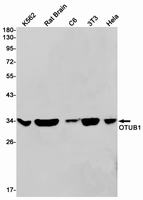
Email Us:info@neweastbio.com
Call Us:(+1) 610-945-2007
Size:100 μl
Price:$ 349
Brand:NewEast  Place of Origin:USA
Immunogen:
Place of Origin:USA
Immunogen:
| Cat.#: N262646 |
| Product Name: Anti-OTUB1 Rabbit Monoclonal Antibody |
| Synonyms: OTUB1; OTB1; OTU1; HSPC263; Ubiquitin thioesterase OTUB1; Deubiquitinating enzyme OTUB1; OTU domain-containing ubiquitin aldehyde-binding protein 1; Otubain-1; hOTU1; Ubiquitin-specific-processing protease OTUB1 |
| UNIPROT ID: Q96FW1 |
| Background: Hydrolase that can specifically remove 'Lys-48'-linked conjugated ubiquitin from proteins and plays an important regulatory role at the level of protein turnover by preventing degradation. Regulator of T-cell anergy, a phenomenon that occurs when T-cells are rendered unresponsive to antigen rechallenge and no longer respond to their cognate antigen. Acts via its interaction with RNF128/GRAIL, a crucial inductor of CD4 T-cell anergy. Isoform 1 destabilizes RNF128, leading to prevent anergy. In contrast, isoform 2 stabilizes RNF128 and promotes anergy. Surprisingly, it regulates RNF128-mediated ubiquitination, but does not deubiquitinate polyubiquitinated RNF128. Deubiquitinates estrogen receptor alpha (ESR1). Mediates deubiquitination of 'Lys-48'-linked polyubiquitin chains, but not 'Lys-63'-linked polyubiquitin chains. Not able to cleave di-ubiquitin. Also capable of removing NEDD8 from NEDD8 conjugates, but with a much lower preference compared to 'Lys-48'-linked ubiquitin.Plays a key non-catalytic role in DNA repair regulation by inhibiting activity of RNF168, an E3 ubiquitin-protein ligase that promotes accumulation of 'Lys-63'-linked histone H2A and H2AX at DNA damage sites. Inhibits RNF168 independently of ubiquitin thioesterase activity by binding and inhibiting UBE2N/UBC13, the E2 partner of RNF168, thereby limiting spreading of 'Lys-63'-linked histone H2A and H2AX marks. Inhibition occurs by binding to free ubiquitin: free ubiquitin acts as an allosteric regulator that increases affinity for UBE2N/UBC13 and disrupts interaction with UBE2V1. The OTUB1-UBE2N/UBC13-free ubiquitin complex adopts a configuration that mimics a cleaved 'Lys48'-linked di-ubiquitin chain.MiscellaneousIn the structure described by PubMed:18954305, the His-265 active site of the catalytic triad is located too far to interact directly with the active site Cys-91. A possible explanation is that OTUB1 is in inactive conformation in absence of ubiquitin and a conformation change may move His-265 in the proximity of Cys-91 in presence of ubiquitin substrate. |
| Immunogen: A synthetic peptide of human OTUB1 |
| Applications: WB,IP |
| Recommended Dilutions: WB: 1/500-1/1000 IP: 1/20 |
| Host Species: Rabbit |
| Clonality: Rabbit Monoclonal |
| Clone ID: R04-6I3 |
| MW: Calculated MW: 31 kDa; Observed MW: 31 kDa |
| Isotype: IgG |
| Purification: Affinity Purified |
| Species Reactivity: Human,Mouse,Rat |
| Conjugation: Unconjugated |
| Modification: Unmodified |
| Constituents: PBS (without Mg2+ and Ca2+), pH 7.3 containing 50% glycerol, 0.5% BSA and 0.02% sodium azide |
| Research Areas: Epigenetics and Nuclear Signaling |
| Storage & Shipping: Store at -20°C. Avoid repeated freezing and thawing |
 Western blot analysis of OTUB1 in K562, rat Brain, C6, 3T3, Hela lysates using OTUB1 antibody. |
Select By Alphabet
A B C D E F G H I J K L M N O P Q R S T U V W X Y Z